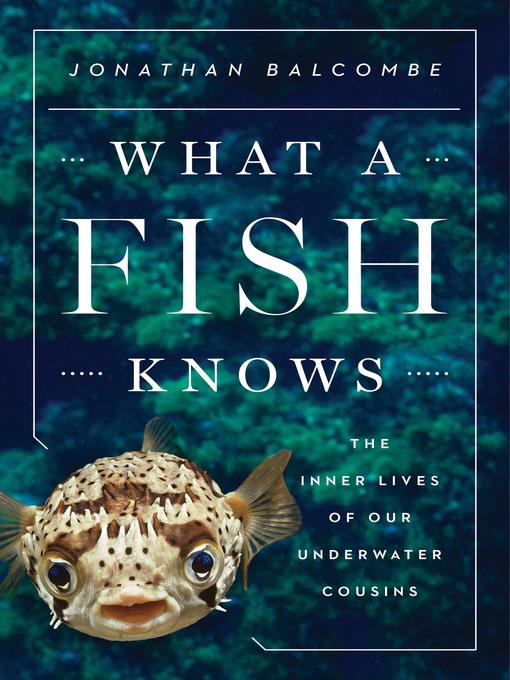
What a Fish Knows
The Inner Lives of Our Underwater Cousins
فرمت کتاب
ebook
تاریخ انتشار
2016
Lexile Score
1280
Reading Level
8-11
ATOS
9.4
Interest Level
6-12(MG+)
نویسنده
Jonathan Balcombeشابک
9780374714338
- اطلاعات
- نقد و بررسی
- دیدگاه کاربران
نقد و بررسی

April 4, 2016
In this entertaining study, ethologist Balcombe (The Exultant Ark) points out that fish are some 60% of all vertebrates on earth, yet they receive little regard outside of being a source of food or object of sport. With the vivacious energy of a cracking good storyteller, Balcombe draws deeply from scientific studies and his own experience with fish to introduce readers to them as sentient creatures that live full lives governed by cognition and perception. He illustrates a piscine capacity for joy and pleasure in the case of a Midas cichlid that returns again and again to a trusted human to be stroked and sometimes held out of the water. Balcombe cites instances of alteration in one fish’s behavior when a traumatic event occurs to another fish in the same tank, concluding that the two are emotionally attuned to each other. Fish, he observes, also actively play with other creatures, and he offers examples that illustrate awareness and intention coupled with a sense of amusement. Balcombe makes a convincing case that fish possess minds and memories, are capable of planning and organizing, and cooperate with one another in webs of social relationships. Agent: Stacey Glick, Dystel & Goderich.

May 15, 2016
Balcombe (The Exultant Ark, 2011) cites Finding Nemo several times in this sparkling exposition on our underwater cousins. That may seem odd in a science book, but it's entirely appropriate to its central thrust, which is that fish are sentient, social, and individuated, like their Disney-animated avatars. As humans' fellow vertebrates, they've developed from the same blueprint, so to speak, though for hundreds of millions of years longertime enough to hone the senses of sight, hearing, smell, taste, orientation, touch, and more to be capable of the superhuman achievements Balcombe reports in the early parts of the book. The really big news here arrives in the central sections on emotions ( From Stress to Joy ); thinking (using tools, planning); knowledge (memory); and sociality (shoaling-schooling, cooperation, peacekeeping) in fish. Although a little of the research that discovered the gamut of fish capabilities hails from the early twentieth century, the preponderance of it is quite recent, reflecting, Balcombe concludes (in a compelling pitch for greatly expanding fish conservation), growing awareness of our i.e., human interdependence with all life. (Reprinted with permission of Booklist, copyright 2016, American Library Association.)

June 1, 2016
Ethologist Balcombe (The Exultant Ark) is an advocate for fish--or, as he prefers, fishes ("individuals with personalities and relationships")--and he makes a strong case for piscine perception. Weaving decades of scientific studies of fish consciousness, cognition, and social structure, he offers a picture of these underwater creatures as complex and sentient beings. Not only do they have acute senses of sight, hearing, and smell, but they also have the capacity to feel pleasure as well as pain. Some species form hierarchical grooming cooperatives, hunt in interspecies packs, help raise nonbiological offspring while waiting their turn to fertilize eggs, and recognize one another after months apart. At times the recitation of "believe it or not" knowledge bites can feel like overreaching to make a point; at others, Balcombe edges toward a decidedly unscientific whimsy--he never met a fish pun he didn't like. Yet altogether, this is a lively and surprising work that makes a strong argument for sport and food fishing reform. VERDICT This may ruin readers' fish dinners forever but will appeal to fans of odd science and animal rights advocates alike.--Lisa Peet, Library Journal
Copyright 2016 Library Journal, LLC Used with permission.

February 1, 2016
Admit it; you don't think a lot about fish. But there are actually 30,000 species of our wet, wriggly brethren, more than all mammal, bird, reptile, and amphibian species combined. Director of animal sentience at the Humane Society Institute for Science and Policy, Balcombe lets us know that fish can be as sociable--or tricky--as humans and other sentient creatures. In-house excitement.
Copyright 2016 Library Journal, LLC Used with permission.




دیدگاه کاربران